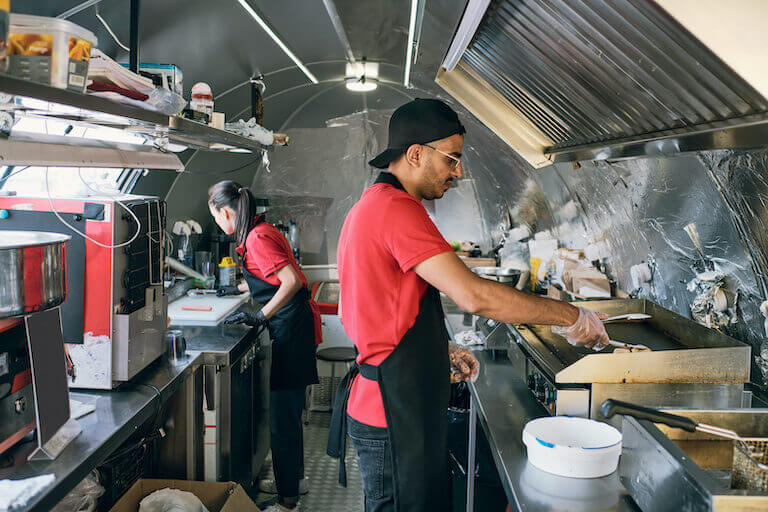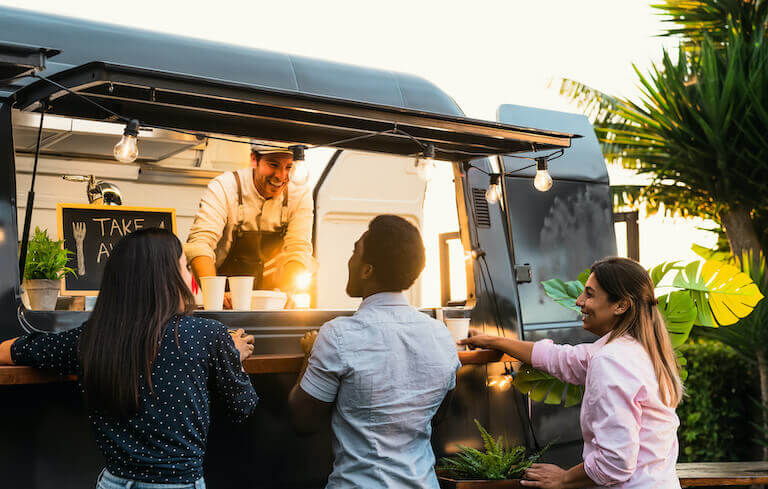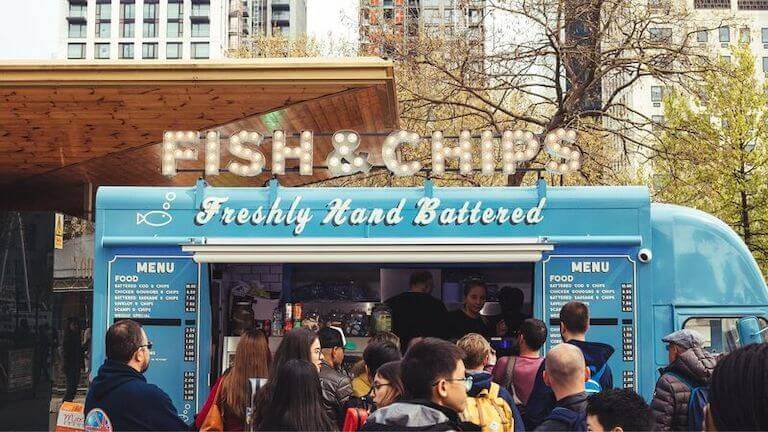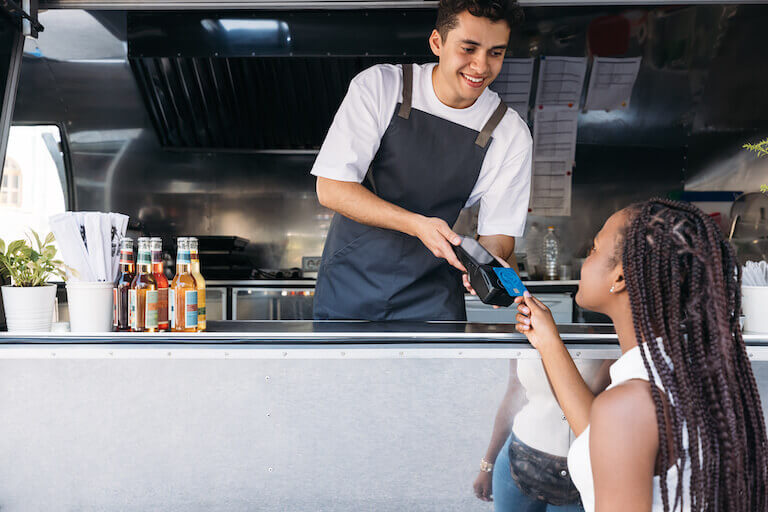You’ve finally done it—after spending more hours than you can remember in the hot, close quarters of your food truck, you’ve realized your vision and made your business a success.
So—what’s your next move?
As you consider ways to expand your business, opening a brick-and-mortar restaurant could be an option you explore. Let’s take a look at some points you might take into account as you weigh whether this move could be right for you—and, if you do choose to go for it, some steps you could take to do it right.
Working Toward Your First Food Truck? Read This First!
Food Truck vs. Restaurant: Is Brick-and-Mortar Right for My Business?
There are certain advantages that a traditional restaurant can offer over a food truck. For one thing, having a larger kitchen and a larger staff can enable you to handle more customers, which can bring in more revenue. The extra physical space can also give you more flexibility, potentially enabling you to offer more menu items without having to worry as much about limited storage space.
A brick-and-mortar restaurant could also bring more predictability to your business—you may never have to worry about the rain chasing all your customers away again! And with your own restaurant space, you can create a more immersive dining experience, which could give your customers all the more reason to come back for more.

Having a full kitchen to work with, rather than the close quarters of a food truck, could be one reason to open a restaurant.
But just because these potential advantages exist doesn’t mean that expanding to a restaurant is right for everyone. Physical restaurants can be costly, meaning your road to profitability could be longer. It also might not be a good fit for your offering—for example, if your clientele is more interested in quick convenience close to work, or if you serve street food-style fare that doesn’t lend itself as well to a sit-down restaurant.
As you consider growing your food truck business, know that opening a restaurant isn’t your only option. For example, you could invest in additional trucks, enabling you to target different areas. Since you already know how your business model works, you might find that you’re able to reproduce it more easily the second time around. Before long, you could find yourself running your own fleet of profitable food trucks!
You might also explore ghost kitchens—commercial kitchens where food is prepared, but not served—which have become a popular method of enjoying the benefits of a physical kitchen without the complexity of managing a front-of-house operation. This can allow you to handle more volume, field pickup or delivery orders, or even get into catering.
The bottom line—you have options. Take a close look at your business model before deciding what’s right for you when it comes to expanding your food truck business.**
How to Pull Off a Successful Food Truck Transition
If you do decide to start a restaurant, you’ll want to be sure to have a step-by-step plan. Since you’re not starting from scratch, but rather building onto an existing business, some aspects of your plan may already be in place. But there are a few additional components unique to the food truck-to-restaurant transition that you may want to keep in mind.
Involve Your Customers
Your food truck became successful because of your loyal customers. Ideally, you’ll be able to harness that enthusiasm as you pivot toward a physical restaurant. To do that, it could be a good idea to loop your customers in on the process. Let them know what you’re thinking, and ask for their feedback on your ideas. This could inform everything from the menu items you choose to the location you ultimately select for your business.
By spreading the word to your customers, you can also start building excitement for your new venture, so that when the time comes to open your doors you’ll have an enthusiastic customer base ready to support you.

Consider sharing your plans with your customers—it could be a great way to build excitement for your new business!
Maintain Your Brand Momentum
Besides your great food, your food truck’s brand is one of your strongest assets. It creates a lasting impression of your business and helps you stand out from competitors. As you transition to a restaurant, you may want to maintain that brand impression so that customers recognize that, even though the restaurant is a new venture, they can still expect the quality you’ve delivered in the past.
If your food truck has an active social media presence, put it to work here—it can enable you to use your existing platform to showcase your new business, effectively harnessing the power of your existing brand to launch your new one.

If you’ve developed a popular brand, use that to your advantage when launching your new venture!
After all, it’s important to note that your restaurant is a new business, and it deserves a brand that’s appropriate for what it is—not necessarily just copying over the branding from your truck. Think about what the “project” of your restaurant is and decide how much of your original food truck’s brand to maintain while doing justice to your new business.
One advantage of maintaining continuity between your restaurant and food truck is that your truck then effectively becomes a rolling billboard for your restaurant, advertising it wherever it goes.
Pick Your Location Wisely
As a food truck owner, you know how important location is to the success of your business. You could be doing everything else right, but if you’re in the wrong spot, you won’t reach your target customers. With a physical restaurant, location may be even more important; you can always move your truck to a better spot, but changing your restaurant’s location is much more difficult. So think hard about where you want to be.

Put at least as much care into selecting the location for your restaurant as you did for your food truck.
Do you want to open near where your food truck usually operates, since your customers are already there? That could allow you to start to operate your truck in another part of your city, perhaps tapping into new opportunities. Or, if you’re content with your food truck location and want to seek out a new customer base with your restaurant, think about who your target customers are and where they are likely to be or would be willing to go. There’s a reason “location, location, location” is a cliche in real estate—it really is that important.
Focus on Service
Possibly the biggest difference in running a physical restaurant is the change in service model. In a food truck, transactions are extremely pared down—often with the same person taking orders, cooking the food, and handling payment. In a restaurant, customers are going to have numerous points of contact with staff during their dining experience, which could last up to one to two hours or even longer, depending on your restaurant’s concept.
Take your time thinking about the type of experience you’d like to offer your customers. Are you going to offer quick counter service with customers picking up their own orders? A more upscale experience with a full wait staff? Once you’ve clarified this point, consider the systems you’ll need in place in order to deliver that experience consistently. This could include obtaining the right POS system and designing an effective menu to developing a training process for your servers—and everything in between.

You’re used to offering your customers great service—maintain that standard as you transition to the more complex operations of a traditional restaurant.
This new service model will likely be more complex than what you’re used to—but with some forethought and planning, you can develop a solid strategy to ensure that every customer has a positive experience.
Hire the Right Team
Limited space in a truck means that there’s a hard cap on the number of employees you can have. But in a restaurant, you’ll likely be working with many more cooks, and possibly a (completely new) front-of-house staff as well.
This may be a new experience for you as a business owner. Running a food truck, your focus has probably been on cooking great food and forming relationships directly with customers. As a restaurant owner, the staff you hire are essential to your success, and you need to take care to ensure you’re surrounding yourself with the right people. Take time while hiring to ensure you’re bringing on the best employees as you transition to this new, service-oriented business model.
Ambitious Entrepreneurs Can Benefit from a Culinary Education
If you have your sights set on growing your business, you might want to consider culinary school. Escoffier’s Food Entrepreneurship or Hospitality & Restaurant Operations Management programs can expose you to fundamental business concepts alongside a culinary foundation taught by experienced Chef Instructors—all of which could prove useful as you embark on this exciting new phase of your career.
Financial aid, grants, and scholarships are available to those who apply and qualify, so don’t wait to pursue your dreams.
INTERESTED IN LEARNING MORE ABOUT MANAGING A FOOD TRUCK? CHECK THESE ARTICLES OUT NEXT!
- The 5 Best Food Truck POS Systems
- How Much Can a Food Truck Cost?
- What Licenses & Permits Are Needed to Start a Food Truck?
*Information may not reflect every student’s experience. Results and outcomes may be based on several factors, such as geographical region or previous experience.
**Auguste Escoffier School of Culinary Arts does not provide legal advice. Always consult with an attorney before creating a new business entity!



